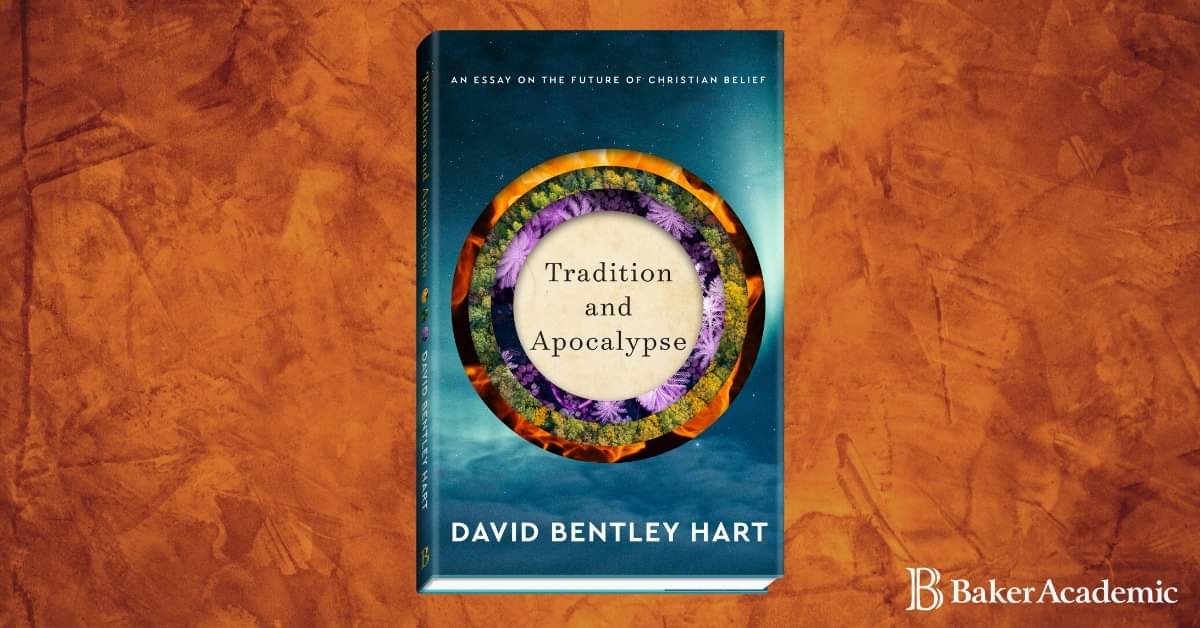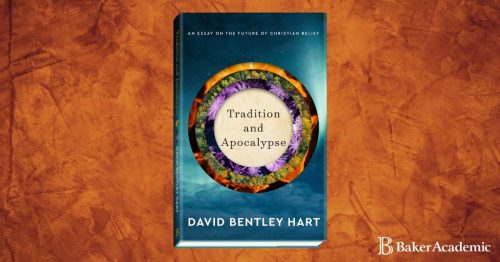

TRADITION AND APOCALYPSE: An Essay on the Future of Christian Belief. By David Bentley Hart. Grand Rapids, MI: Baker Academic, 2022.
What does tradition have to do with apocalypse? One has to do with the past and the other with the future, or so one would think. But perhaps there’s more to it than that! Perhaps the key to answering this question is that what we think of as Tradition may be incorrect. It might be more obscure and problematic than we’ve been led to believe. As for apocalypse, well, we likely have misinterpreted it as well. I was drawn to the title of this book by David Bentley Hart—Tradition and Apocalypse—because I’m a historian who values the past but who also understands that we must not neglect the future, for that is we’re heading. So, what might apocalypse have to do with Tradition?

Robert D. Cornwall
David Bentley Hart’s book Tradition and Apocalypse is really focused on Tradition, especially the way in which John Henry Newman and Maurice Blondel wrote about the idea of the development of doctrine/tradition. He’s not convinced they got it right and he wants us to know why.
Hart is an intriguing person who is not afraid to state boldly his position on things whether it’s Tradition or salvation or politics. He’s a convert to Eastern Orthodoxy from Anglicanism. He’s a political liberal, who believes strongly in universal salvation (see his book That All Shall Be Saved: Heaven, Hell, and Universal Salvation, Yale University Press, 2019). When it comes to Orthodoxy, he opposes Neo-Palamism (a theological perspective that draws on the medieval Orthodox theologian Gregory Palamas) that he believes dominates Orthodoxy today, at least in North America. In this regard, he holds out Sergius Bulgakov as the most important modern Orthodox theologian, and Bulgakov also opposed Neo-Palamism. Although he is a convert himself, he’s deeply concerned about the inordinate influence of fundamentalist Protestant converts on modern Orthodoxy (there has been a steady stream of converts in recent decades).
Hart’s prose is lively yet dense. He pushes his arguments hard, often using words that require even an educated person to look them up in the dictionary. In other words, this is not an easy read, but worth the effort.
Hart opens the essay (that is what he calls this book) by declaring that “‘tradition’ in the theological sense, however lucid and cogent it might appear to the eyes of faith, is incorrigibly obscure and incoherent” (p. 1). This is true even with regard to the form that Christian theologians have embraced since John Henry Newman published his Essay on the Development of Christian Doctrine. He spends much of the first couple of chapters engaging with Newman and Maurice Blondel, whom he believes are the only persons who have contributed anything of value on this matter. Despite their efforts, he believes that they failed to lay out a cogent argument for doctrinal development. What he seeks is “a concept of tradition that can simultaneously assure us of an essential immutability in Christian confession while also offering us a credible apologia for all the transformations through which that confession has manifestly gone over the centuries” (p. 5). This is what Newman and Blondel attempted to do, but failed to accomplish this task, at least in Hart’s estimation.
Tradition and Apocalypse is comprised of seven chapters, all of which explore the concept of Tradition. It’s only as Hart reaches the end of the book that he focuses on the relationship between Tradition and Apocalypse (chapters 6 and 7). I will admit I was expecting more on apocalypse than Hart offers, but it is the endpoint of the conversation (and he does devote over fifty pages of a relatively brief book to the topic). While apocalypse is the endgame, he starts the conversation by taking up the relationship between tradition and traditionalism. One thing that is clear is that Hart is not averse to Tradition, but he doesn’t believe that there is an intrinsic unity to Tradition. In other words, there are many traditions but not one Tradition. Thus, the recognition that though the basic foundation is unchangeable, it has taken on many forms.
Having laid this foundation, Hart moves in chapter two to the question of causality. Here, he takes up the question as to whether there exists a logically necessary development of tradition. This question is wrapped up in questions of metaphysics. The focus here is on whether there is an inherent natural end to tradition, such that everything is moving toward its natural endpoint. Here he declares that “All Christian communions of any size or duration have their distinctive traditionalisms, their myths of continuity amidst rupture and rupture amidst continuity, their claims of doctrinal pedigree and of allegiance to the authority of the Christiaan past, and their often overweening confidence regarding their own grasp of those clearly correct orthodoxies that other communions have distorted or occluded or betrayed” (p. 42). In other words, no matter how we slice it, we all have a stake in doctrinal continuity.
Hart’s discussion of causality leads to a deeper conversation about the relationship of Tradition to development (chapter 3). He’s not focused on the question of whether development has occurred, but on whether development is necessary (remember that at least in his politics he’s very liberal). This is largely a chapter focused on Newman’s criteria for judging theological development, as well as a look at Blondel’s later effort. He concludes that “ultimately, Newman’s treatise proved, if it proved anything at all, that any attempt to demonstrate from the historical evidence that the development of ‘orthodox’ Christian doctrine has been a process of disclosure—the progressive explication of a content latent in the faith from its inception—is simply hopeless.” (p. 88). Newman made a good try, but in the end, it failed.
From development, we move to history (chapter 4). Here Hart explodes the idea that there is an unambiguous seamless process of doctrinal development that can be shown through the study of history. In his view, this simply doesn’t exist. Here is where apocalypse seeps in. Tradition is not simply the doctrines of the past, tradition if it is to have meaning must be approached from where it is going. He’s concerned about those who believe that doctrine is fixed, even if being revealed over time. As he notes in chapter five, which focuses on “Tradition and Doctrine,” tradition that is fully theological must be continually reconstructed, with new understandings of things being reinterpreted and refashioned. He writes that “From the time of Jesus himself to the present, there has always been a struggle within the tradition between the guardians of religious and social stability and the apocalyptic ferment of the Gospel. But, of course, the Gospel is nothing if it is not apocalyptic” (p. 131). When we get to this point, we’re nearing the end of the essay. However, the key point of the essay is about to be unveiled, that is the relationship between tradition and apocalypse!
Hart titles chapter six “Tradition and Apocalypse.” Here he notes that in the earliest generations of the church there was no fixed doctrine or structure (this is an important revelation since he is Orthodox and many Orthodox believe they are the heirs of the Apostles). He affirms what many if not most scholars believe that there was a diversity of theological and organizational expression in the earliest years. One key reason for this was the belief that the second coming and the day of judgment were close at hand. This apocalyptic viewpoint kept the church from over-institutionalizing early in its existence. While the Kingdom of God was the defining vision of the church, doctrinal purity wasn’t at the top of the list of concerns.
That concern developed later as the church took on more institutional trappings. He writes that “we should therefore never forget that official doctrine is, above all else, a language of disillusionment” (p. 134). While things did settle in after a while, Hart believes that there is something inherently self-destructive within Christianity. That is, “there is, simply said, a distinct element of the ungovernable and seditious within the Gospel’s power to persuade, one that we ignore only at the cost of fundamentally misunderstanding its most essential character.” (p. 137). This comes from someone who is member of the Eastern Orthodox tradition. Further on, he suggests that if tradition is a truly living thing, then it is a “handing over.” That is, it involves handing over through time, “a transmission, the impartation of a gift that remains sealed, a giving always deferred toward a future not yet known—that the secret inner presence in tradition can be made manifest at all.” This gift must be kept sealed till the end. (p. 140).
Hart closes the book with a chapter titled “Tradition as Apocalypse.” Here he draws on the definition of apocalypse as revelation or unveiling. What he has in mind here is an ideal view of reality, that that is both essential and yet inexhaustible. In this regard, he finds the efforts of Newman and Blondel insufficient to the task. He affirms a continuity/stability of belief and yet understands that doctrinal development has taken place. He also believes that doctrinal development is leading somewhere. As he contemplates all of this he envisions unity in the church but not one that is narrow in its orientation. While he’s committed to the immutability of tradition, he’s concerned about the growth of fundamentalism in the church. In fact, he’s deeply concerned about the impact of Protestant fundamentalism on Orthodoxy, fundamentalism that derives in large part through conversion.
In his resistance to fundamentalism, he reveals his rejection of the idea that there is a doctrinal unity among the Fathers that can be embraced by the contemporary church. He equates this view with Neo-Palamism (I’m assuming he has in mind the work of people like Vladimir Lossky and Alexander Schmemann, whose work draws upon the earlier work of the medieval theologian Gregory Palamas). He suggests that this vision of Orthodox doctrine is attractive to former Protestant fundamentalists. So, since he opposes Neo-Palamism, he offers us an alternative, and that would be Sergius Bulgakov, whom he believes was the greatest theologian of the twentieth century, as well as Maximus the Confessor, whom he believes, are the most potent conversationalists when it comes to envisioning the future. Just a note on Bulgakov, a twentieth century Russian Orthodox philosopher who lived in exile in France, he was deeply interested in eschatology and apocalyptic theology, including universal salvation. Thus, this area of interest connects well to what Hart is trying to do here.
As in Hart’s other books, Tradition and Apocalypse has strong polemical elements. He’s not afraid to express his opinion. While he identifies as Orthodox, I’m not sure how influential he is in those circles. That being said, with growing numbers of Christians interested in Eastern Orthodoxy, his profile has increased considerably. What can be said is that Hart challenges our certainties and pushes our buttons. With the war in Ukraine raising the profile of Orthodoxy, it is helpful to read books by Orthodox theologians and philosophers who can help us get a sense of the diversity of perspectives within the tradition. Reading a book like this can be a bit overwhelming. It’s not for the faint of heart, but in the end, I find David Bentley Hart to be intriguing at the very least. One thing he does is remind us that belief in universal salvation isn’t new. So, if you’re ready for something challenging and yet enlightening, I invite you to take up Hart’s Tradition and Apocalypse and read it for yourself. You might also keep a dictionary handy as you do so.
This review originally appeared on BobCornwall.com.
Robert D. Cornwall is an ordained minister in the Christian Church (Disciples of Christ). Now retired from his ministry at Central Woodward Christian Church (Disciples of Christ) of Troy, Michigan, he serves as Minister-at-Large in Troy. He holds a Ph.D. in Historical Theology from Fuller Theological Seminary and is the author of numerous books including his latest books: Called to Bless: Finding Hope by Reclaiming Our Spiritual Roots (Cascade Books, 2021) and Unfettered Spirit: Spiritual Gifts for the New Great Awakening, 2nd Edition, (Energion Publications, 2021). His blog Ponderings on a Faith Journey can be found at www.bobcornwall.com.






